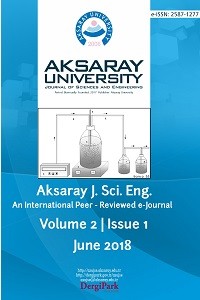Abstract
Minarets
are built adjacent to mosques and used for calling Muslims to mosques for pray.
Almost all masonry minarets in Turkey
and similar Muslim countries have been damaged due to medium intensity seismic
actions or at least moderate winds. One of the reasons for this is that these
structures are thin and long. Another reason is that the minarets built without
any engineering knowledge today. In this study, 7 masonry minarets with single
balcony, located in the city center of Aksaray (middle Anatolia),
are investigated in terms of seismic behaviors. The mentioned minarets were
geometrically measured using photogrammetric devices and techniques. Measured
minarets were modeled using Finite Element Method with LUSAS Software, and
seismic analyses were performed. Structural analyzes are compared with each
other and the results obtained are interpreted.
References
- [1] A. Ural, A. Dogangun and S. Meraki, Response evaluation of historical crooked minaret under wind and earthquake loadings. Wind and Structures, 17(3) (2013) 345–359.
- [2] A. Dogangun, R. Acar, H. Sezen and R. Livaoglu, Investigation of dynamic response of masonry minaret structures. Bulletin of Earthquake Engineering, 6(3) (2008) 505–517.
- [3] A.C. Altunişik, Dynamic response of masonry minarets strengthened with Fiber Reinforced Polymer (FRP) composites. Natural Hazards and Earth System Science, 11(7) (2011) 2011–2019.
- [4] R.K. Pekgökgöz, M.A. Gürel, Z. Mammadov and F. Çili, Dynamic Analysis of Vertically Post-Tensioned Masonry Minarets. Journal of Earthquake Engineering, 17(4) (2013) 560–589.
- [5] C.S. Oliveira, E. Çaktı, D. Stengel, M. Branco, Minaret behavior under earthquake loading: The case of historical Istanbul. Earthquake Engineering & Structural Dynamics, 41(1) (2012) 19–39.
- [6] K. Hacıefendioğlu, Seasonally frozen soil’s effect on stochastic response of masonry minaret–soil interaction systems to random seismic excitation. Cold Regions Science and Technology, 60(1) (2010) 66–74.
- [7] K. Haciefendi̇oğlu and F. Bi̇ri̇nci̇, Stochastic dynamic response of masonry minarets subjected to random blast and earthquake-induced ground motions. The Structural Design of Tall and Special Buildings, 20(6) (2011) 669–678.
- [8] T. Karabork and Y. Kocak, New metal connectors developed to improve the shear strength of stone masonry walls. Structural Engineering and Mechanics, 50(1) (2014) 121–135.
- [9] A. Doğangün, H. Sezen, Ö.İ. Tuluk, R. Livaoğlu and R. Acar, Traditional Turkish Masonry Monumental Structures and their Earthquake Response. International Journal of Architectural Heritage, 1(3) (2007) 251–271.
- [10] E. Güleç, Kayseri Minareleri (Cumhuriyet Dönemine Kadar). Erciyes Üniversitesi Sosyal Bilimleri Enstitüsü Yüksek Lisans Tezi, Kayseri (2006).
- [11] E. Ertek, Osmanlı Minarelerinin Yapısal Modellenmesi ve Deprem Analizi. Gebze Yüksek Teknoloji Enstitüsü Mühendislik ve Fen Bilimleri Enstitüsü Yüksek Lisans Tezi, Gebze (2009).
- [12] M.H. Baştürk, Bursa tari̇hi̇ yiğma mi̇nareleri̇ni̇n di̇nami̇k davranişlarinin modal anali̇z yöntemi̇ i̇le i̇ncelenmesi̇. Uludağ Üniversitesi Fen Bilimleri Enstitüsü Yüksek Lisans Tezi, Bursa (2013).
- [13] Lusas, Finite element analysis software products. Finite Element System FEA Ltd, (UK 2013).
- [14] A. Ural and S. Uslu, Shear tests on stone masonry walls with metal connectors. European Journal of Environmental and Civil Engineering, 18(1) (2014) 66–86.
- [15] A. Ural and F.K. Firat, Evaluation of masonry minarets collapsed by a strong wind under uncertainty. Natural Hazards, 76(2) (2015) 999–1018.
- [16] DBYBHY, Deprem Bölgelerinde Yapılacak Binalar Hakkında Yönetmelik. Türk Standartları Enstitüsü, Ankara (2007).
- [17] S. Uslu, Tarihi yığma yapılarda kullanılan metal bağlantı elemanlarının deneysel metotlarla incelenmesi. Aksaray Üniversitesi Fen Bilimleri Enstitüsü Yüksek Lisans Tezi, Aksaray (2013).
Abstract
Minareler,
Müslümanları namaza çağırmak için İslam dininin ibadet yeri olan camilere
bitişik olarak inşa edilmiştir. Türkiye’de ve diğer Müslüman ülkelerde yığma
minarelerin büyük çoğunluğu orta şiddetli bir deprem ya da hafif şiddetli bir
rüzgâr etkisiyle zarar görebilmektedir. Bunun nedenlerinden biri bu yapıların
ince ve uzun olmasıdır. Bir diğer sebebi ise özellikle günümüzde inşa edilen
minarelerin herhangi bir mühendislik bilgisi olmadan yapılmasıdır. Bu çalışmada,
Aksaray il merkezinde yer alan tek şerefeli 7 adet yığma minarenin deprem
davranışları incelenmiştir. Bahsedilen minarelerin geometrik ölçümleri
fotogrametrik cihazlar kullanılarak yapılmıştır. Sonlu Elemanlar Metodunu
kullanan LUSAS programı ile minareler modellenerek deprem analizleri yapılmıştır.
Yapısal analizler birbirleriyle karşılaştırılarak elde edilen sonuçlar
yorumlanmıştır.
References
- [1] A. Ural, A. Dogangun and S. Meraki, Response evaluation of historical crooked minaret under wind and earthquake loadings. Wind and Structures, 17(3) (2013) 345–359.
- [2] A. Dogangun, R. Acar, H. Sezen and R. Livaoglu, Investigation of dynamic response of masonry minaret structures. Bulletin of Earthquake Engineering, 6(3) (2008) 505–517.
- [3] A.C. Altunişik, Dynamic response of masonry minarets strengthened with Fiber Reinforced Polymer (FRP) composites. Natural Hazards and Earth System Science, 11(7) (2011) 2011–2019.
- [4] R.K. Pekgökgöz, M.A. Gürel, Z. Mammadov and F. Çili, Dynamic Analysis of Vertically Post-Tensioned Masonry Minarets. Journal of Earthquake Engineering, 17(4) (2013) 560–589.
- [5] C.S. Oliveira, E. Çaktı, D. Stengel, M. Branco, Minaret behavior under earthquake loading: The case of historical Istanbul. Earthquake Engineering & Structural Dynamics, 41(1) (2012) 19–39.
- [6] K. Hacıefendioğlu, Seasonally frozen soil’s effect on stochastic response of masonry minaret–soil interaction systems to random seismic excitation. Cold Regions Science and Technology, 60(1) (2010) 66–74.
- [7] K. Haciefendi̇oğlu and F. Bi̇ri̇nci̇, Stochastic dynamic response of masonry minarets subjected to random blast and earthquake-induced ground motions. The Structural Design of Tall and Special Buildings, 20(6) (2011) 669–678.
- [8] T. Karabork and Y. Kocak, New metal connectors developed to improve the shear strength of stone masonry walls. Structural Engineering and Mechanics, 50(1) (2014) 121–135.
- [9] A. Doğangün, H. Sezen, Ö.İ. Tuluk, R. Livaoğlu and R. Acar, Traditional Turkish Masonry Monumental Structures and their Earthquake Response. International Journal of Architectural Heritage, 1(3) (2007) 251–271.
- [10] E. Güleç, Kayseri Minareleri (Cumhuriyet Dönemine Kadar). Erciyes Üniversitesi Sosyal Bilimleri Enstitüsü Yüksek Lisans Tezi, Kayseri (2006).
- [11] E. Ertek, Osmanlı Minarelerinin Yapısal Modellenmesi ve Deprem Analizi. Gebze Yüksek Teknoloji Enstitüsü Mühendislik ve Fen Bilimleri Enstitüsü Yüksek Lisans Tezi, Gebze (2009).
- [12] M.H. Baştürk, Bursa tari̇hi̇ yiğma mi̇nareleri̇ni̇n di̇nami̇k davranişlarinin modal anali̇z yöntemi̇ i̇le i̇ncelenmesi̇. Uludağ Üniversitesi Fen Bilimleri Enstitüsü Yüksek Lisans Tezi, Bursa (2013).
- [13] Lusas, Finite element analysis software products. Finite Element System FEA Ltd, (UK 2013).
- [14] A. Ural and S. Uslu, Shear tests on stone masonry walls with metal connectors. European Journal of Environmental and Civil Engineering, 18(1) (2014) 66–86.
- [15] A. Ural and F.K. Firat, Evaluation of masonry minarets collapsed by a strong wind under uncertainty. Natural Hazards, 76(2) (2015) 999–1018.
- [16] DBYBHY, Deprem Bölgelerinde Yapılacak Binalar Hakkında Yönetmelik. Türk Standartları Enstitüsü, Ankara (2007).
- [17] S. Uslu, Tarihi yığma yapılarda kullanılan metal bağlantı elemanlarının deneysel metotlarla incelenmesi. Aksaray Üniversitesi Fen Bilimleri Enstitüsü Yüksek Lisans Tezi, Aksaray (2013).
Details
| Primary Language | Turkish |
|---|---|
| Subjects | Engineering |
| Journal Section | Research Article |
| Authors | |
| Publication Date | June 30, 2018 |
| Submission Date | December 26, 2017 |
| Acceptance Date | April 12, 2018 |
| Published in Issue | Year 2018 Volume: 2 Issue: 1 |
Cited By
Numerical Investigation of the Effect of Water Level on Submerged Minarets
Journal of the Institute of Science and Technology
Abdullah DEMİR
https://doi.org/10.21597/jist.754206
24 Ocak 2020 Sivrice Depremi Sonrasında Elazığ İlinde Bulunan Minarelerde Meydana Gelen Hasarların Araştırılması ve Değerlendirilmesi
Fırat Üniversitesi Mühendislik Bilimleri Dergisi
https://doi.org/10.35234/fumbd.838261
TBDY-2018’DE VERİLEN TASARIM SPEKTRUMLARININ ANITSAL YIĞMA YAPI SİSMİK DAVRANIŞINA ETKİSİ
Adıyaman Üniversitesi Mühendislik Bilimleri Dergisi
https://doi.org/10.54365/adyumbd.1051120
Tarihi Yığma Minarelerin Deprem Yükü Altındaki Davranışlarının 6 Şubat Kahramanmaraş Depremlerinde Hasar Görmüş Cami Örnekleri Üzerinden Mimari Açıdan İncelenmesi
Mimarlık Bilimleri ve Uygulamaları Dergisi (MBUD)
https://doi.org/10.30785/mbud.1318660
Evaluation of The Materials of A Historical Building in Terms of Restoration: The Case of Ankara Kaleci̇k Castle
Bitlis Eren Üniversitesi Fen Bilimleri Dergisi
https://doi.org/10.17798/bitlisfen.1635194
Effect of Direction of Loading on Seismic Response of Historical Masonry Minarets: The Minaret of Aksaray Zafer Mosque
Black Sea Journal of Engineering and Science
https://doi.org/10.34248/bsengineering.1673744
Aksaray J. Sci. Eng. | e-ISSN: 2587-1277 | Period: Biannually | Founded: 2017 | Publisher: Aksaray University | https://asujse.aksaray.edu.tr
ASUJSE is indexing&Archiving in










